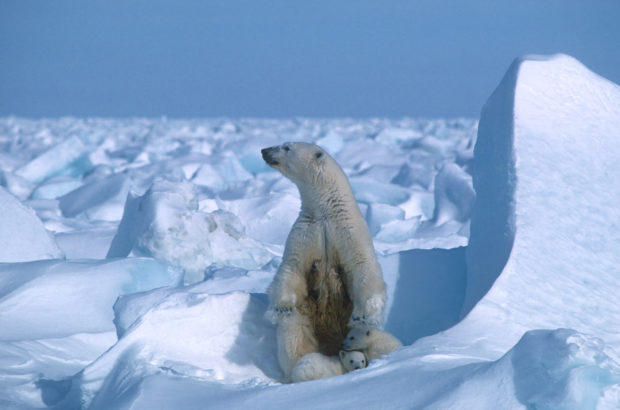Polar bear kills woman and baby in remote Alaskan village

In this file photo taken on January 01, 1985 a handout photo made available on July 17, 2020 by Polar Bears International shows a polar bear with its cubs in the Sea Ice, northeast of Prudhoe Bay in Alaska in 1985. A polar bear on a rampage killed a woman and a boy in a remote area of Alaska, police said, in a rare attack on humans. (Photo by Steven C. AMSTRUP / POLAR BEARS INTERNATIONAL / AFP)
LOS ANGELES — A polar bear killed a young woman and her baby son in a remote area of Alaska, police said, in a rare attack by an animal battling the worst effects of human-caused climate change.
Police said the bear roamed into the tiny community of Wales on the far western coast of America’s wildest state, where it began chasing people.
It set upon 24-year-old Summer Myomick and her one-year-old son Clyde Ongtowasruk near the community’s school, state troopers said.
A local resident shot and killed the animal during the attack, but the mauling was so severe that mother and baby perished, they said of Tuesday’s tragedy.
Troopers and Fish and Game Department authorities were trying to reach the town “as weather conditions allow,” they added.
Article continues after this advertisementWales, a village of about 150 people on the Bering Strait that separates the United States from Russia, is part of the Alaska Nannut Co-Management Council, a group of Indigenous communities that have traditionally hunted polar bears for subsistence.
Article continues after this advertisementSatellite images show a desolate environment with just a few dozen low-rise buildings, mostly huddled along the seashore.
As well as a small post office, there is an airstrip, and what appears to be a single road leading out of the village.
Climate change
Geoff York, senior director of conservation at Polar Bears International, an NGO specializing in the animal said a deadly episode like this was highly unusual.
“It’s very rare for a polar bear to attack and kill a person historically, anywhere across the Arctic,” he told AFP.
“It’s even more rare for that to happen in the middle of January in the high Arctic, where there’s plenty of sea ice and polar bears are typically out… hunting seals.”
The NGO said only 20 people worldwide are known to have been killed by polar bears between 1870 and 2014, though the frequency of attacks is increasing.
The giant bears — males can grow up to 1,500 pounds (680 kilograms) — face increasing threats from climate change, with their Arctic sea ice habitat disappearing as the planet’s far north warms four times faster than the rest of the world.
This climate change, driven by humanity’s voracious use of planet-warming fossil fuels, “is causing an increase in human-polar bear interaction across the Arctic,” York said.
Historically, most polar bear attacks on humans have happened between late July and early December, a time when there is less ice around.
Bears at either end of their lives are more likely to be aggressive to humans.
“Bears that are either young… and very ravenously hungry all the time because their body is requiring that energy for growth, or… bears that are maybe reaching the end of their life and are having trouble… competing with other bears for good areas to hunt,” York said.
Some Arctic communities employ polar bear patrols to protect residents from the animals, though one was not currently in operation in Wales, according to the Anchorage Daily News.
RELATED STORIES